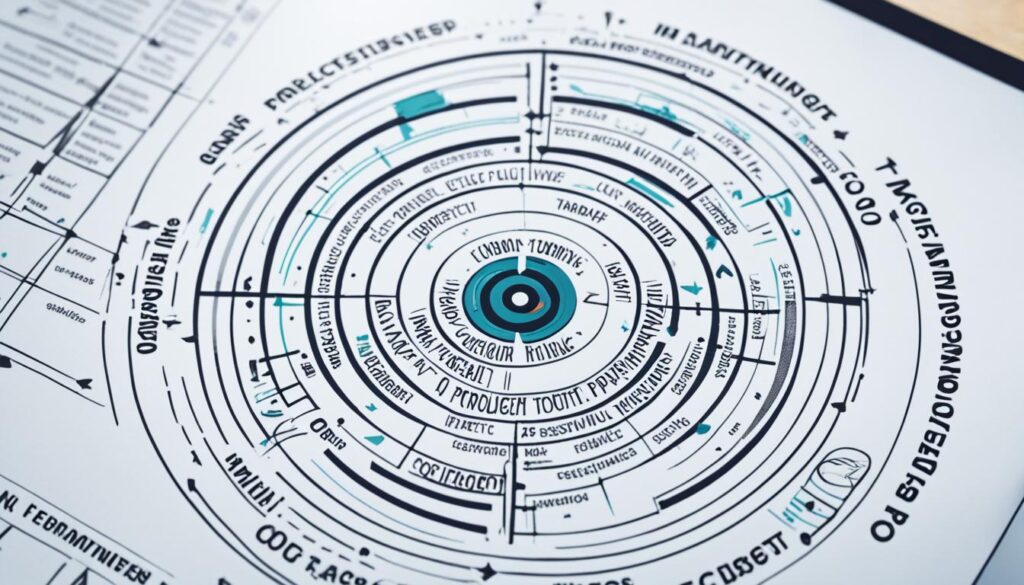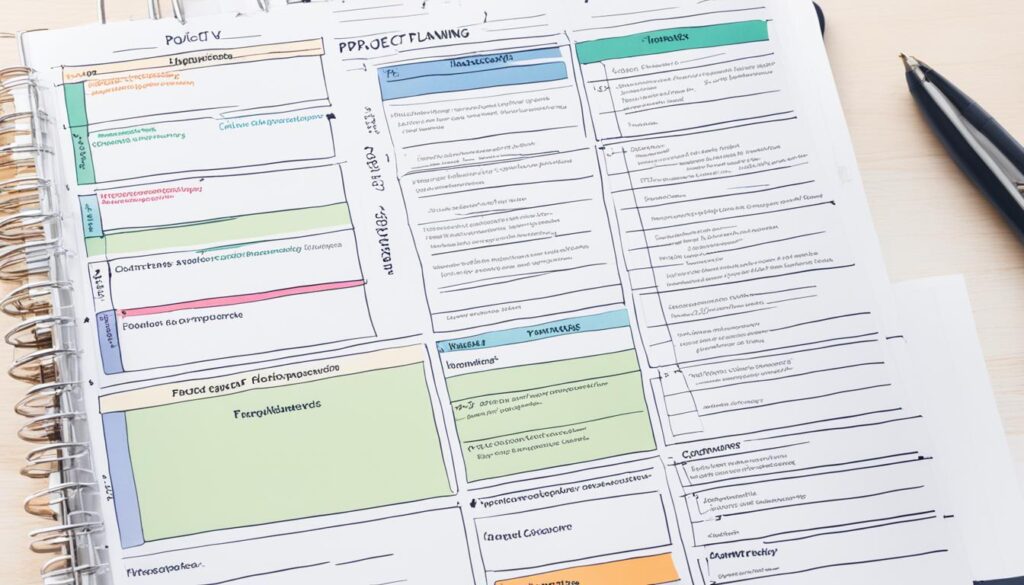Elevate Your Success with Project Management and Time Tracking
“Success is not the key to happiness. Happiness is the key to success. If you love what you are doing, you will be successful.” – Albert Schweitzer
In today’s fast-paced and competitive business landscape, efficient project management skills are crucial for achieving success. Whether you are a seasoned professional or just starting your career, mastering the art of project management can make a significant impact on your abilities to deliver impactful results.
Combining the power of project management with effective time tracking practices can elevate your efficiency, productivity, and ultimately, the outcome of your projects. By developing and honing your project management abilities, you can become an impactful project manager who consistently delivers successful projects on time and within budget.
In this article, we will explore practical tips and strategies to help you elevate your project management skills and maximize your success. From understanding project objectives clearly to creating well-defined project scopes, communicating effectively and frequently, developing comprehensive project plans, and continuously innovating and improving, we will delve into the fundamental steps that will transform you into a project management powerhouse.
Are you ready to take your project management skills to new heights? Let’s dive in!
Tip 1: Understand the Project’s Objectives Clearly
Understanding the objectives of a project is the foundation of effective project management. When you have a clear understanding of the project objectives, you can align your team members and ensure focused efforts towards achieving the desired outcomes. By clarifying the project objectives, you enable efficient planning, execution, and decision-making throughout the project lifecycle.
One way to gain a comprehensive understanding of the project objectives is to meet with stakeholders. Engaging in discussions and actively listening to their expectations and requirements will help you identify the core objectives of the project. During these meetings, don’t hesitate to ask clarifying questions to ensure you have a solid grasp of what needs to be accomplished.
Documenting the project objectives is also crucial for maintaining clarity and consistency. By putting the objectives in writing, you create a reference point that can be shared with the project team. This documentation serves as a reminder of the project’s purpose and helps everyone stay aligned and focused on the end goals.
Regularly reviewing the project objectives is essential to keep them top of mind throughout the project. As the project progresses and evolves, it’s important to assess whether the objectives are still relevant and achievable. If any adjustments or refinements are necessary, make sure to communicate them to the project team to ensure continued alignment.
By understanding the project objectives clearly, you empower your project team to make improved decisions and work towards enhanced productivity. This understanding sets the stage for success by providing a solid foundation for all project activities and ensuring that everyone is working towards a unified purpose.
Tip 2: Create a Well-Defined Project Scope
One of the key factors in managing projects effectively is creating a well-defined project scope. A project scope outlines the specific goals, deliverables, and boundaries of the project. It sets clear expectations for both the project team and stakeholders, ensuring everyone is on the same page.
A well-defined project scope serves multiple purposes. Firstly, it helps prevent scope creep, which refers to the tendency for a project’s scope to expand beyond what was initially agreed upon. When a project scope is not well-defined, it becomes difficult to manage changes and control the project’s direction, resulting in delays and increased costs.
Secondly, a clear project scope aids in resource allocation. By clearly defining the project’s boundaries and goals, you can allocate resources effectively, ensuring that they are utilized optimally. With a well-defined project scope, you can identify the specific resources required, estimate their quantities, and allocate them accordingly.
Creating a well-defined project scope involves several steps. It begins with involving stakeholders early in the project to gain a comprehensive understanding of their expectations and requirements. By actively listening to their inputs, you can shape the project scope to align with their needs.

Documenting a detailed scope statement is a crucial part of the process. This statement outlines the project’s objectives, deliverables, key milestones, timelines, and any constraints or assumptions. It acts as a reference document throughout the project, providing a clear framework for decision-making and progress tracking.
A well-defined project scope should also clearly define what is included and excluded from the project. By explicitly stating what falls within the project’s boundaries, you avoid confusion and ensure that everyone understands what is within the scope of work.
Lastly, using a work breakdown structure (WBS) can help in creating a well-defined project scope. A WBS breaks down the project into smaller, more manageable tasks and sub-tasks. It provides a visual representation of the project’s scope, helping to identify all the necessary components and their relationships. This further aids in resource allocation and project planning.
By following these steps and creating a well-defined project scope, you establish a solid foundation for project success. It helps mitigate risks, improves communication, and ensures that projects are delivered within the agreed-upon constraints.
Tip 3: Communicate Effectively and Frequently
Effective and frequent communication plays a vital role in successful project management. It not only fosters collaboration and resolves conflicts but also promotes transparency, ensuring all team members are on the same page. By implementing a few key strategies, you can enhance your communication practices and elevate the effectiveness of your project management.
To begin with, establish clear communication channels among team members to facilitate seamless information flow. Regularly scheduled team meetings, virtual collaboration platforms, and designated communication tools such as Slack or Microsoft Teams can help facilitate effective communication.
Additionally, define reporting structures within your project team. Clearly outline channels for reporting progress, issues, and updates to ensure everyone is aware of project developments. This clarity promotes accountability and keeps stakeholders well-informed.
Practicing active listening is also crucial in effective communication. By giving your full attention to others, seeking to understand their perspectives, and acknowledging their input, you create an atmosphere of respect and collaboration. This fosters open dialogue and encourages team members to share their thoughts and ideas freely.
Furthermore, providing timely updates to all stakeholders is essential for maintaining transparency throughout the project. Regularly communicate project status, milestones achieved, and any significant changes to ensure everyone is aware of the project’s progress.
Lastly, encourage open dialogue and create a safe space for team members to voice their opinions and concerns. Building a culture of open communication promotes creativity, encourages diverse perspectives, and allows for effective problem-solving.
By prioritizing effective and frequent communication, you can enhance team collaboration, resolve issues efficiently, and foster transparency within your projects.
Remember, effective communication is the cornerstone of successful project management, and it sets the stage for achieving project goals and exceeding stakeholder expectations.

| Strategy | Description |
|---|---|
| Establish clear communication channels | Set up platforms and tools for seamless information flow |
| Define reporting structures | Outline channels for reporting progress, issues, and updates |
| Practice active listening | Show attentiveness, seek understanding, and acknowledge input |
| Provide timely updates | Regularly communicate project status and milestones achieved |
| Encourage open dialogue | Create a safe space for team members to voice opinions and concerns |
Tip 4: Develop a Comprehensive Project Plan
Developing a comprehensive project plan is a critical step in refining your project management skills. By creating a detailed plan, you can effectively outline the goals, deliverables, timelines, resources, risks, and communication strategies required for project success.
A well-structured project plan serves as a roadmap, guiding you and your team towards project milestones and objectives. It ensures clarity, facilitates efficient resource management, and enables effective project monitoring.
Here are key components to include in your project plan:
- Goals: Clearly define the objectives and outcomes you hope to achieve with your project. Having specific and measurable goals will keep everyone aligned and focused on the desired results.
- Deliverables: Identify the tangible outputs and milestones that mark significant progress in your project. These deliverables act as checkpoints, giving you and your team a sense of accomplishment and direction.
- Timelines: Establish a realistic timeline by breaking down the project into smaller tasks with associated deadlines. This ensures that progress stays on track and allows for effective resource allocation.
- Resources: Determine the necessary resources, such as personnel, equipment, and budget, needed to successfully execute your project. Efficient resource management ensures that you have the right people and tools at each stage of the project.
- Risks: Anticipate potential obstacles and risks that may arise during the project. Identify strategies to mitigate these risks and have contingency plans in place to minimize their impact on project progress.
- Communication: Establish clear communication channels and protocols to ensure effective collaboration and information sharing among project stakeholders. Regularly update and engage team members to keep everyone informed and aligned.
Tracking progress, allocating resources, monitoring project milestones, and implementing effective control mechanisms are crucial elements of project management. By continuously evaluating and adjusting your project plan as needed, you’ll be able to enhance project organization, efficiency, and overall success.
Example of a Project Plan Table:
| Phase | Tasks | Timeline | Resources | Progress |
|---|---|---|---|---|
| Initiation | Create project charter | Week 1 | Project manager, stakeholders | 100% |
| Planning | Define project scope | Week 2 | Project manager, team | 75% |
| Execution | Develop and test prototype | Week 3-4 | Development team | 50% |
| Monitoring | Review project progress | Week 4-5 | Project manager, stakeholders | 25% |
| Closure | Conduct project evaluation | Week 6 | Project manager, team | 0% |
Tracking project progress through defined milestones and regularly updating the project plan allows you to visualize the allocation of resources, monitor the status of tasks, and make informed decisions. It provides a comprehensive overview of the project, fosters accountability within the team, and ensures successful project closure.

Tip 5: Continuously Innovate and Improve
Successful project management requires a mindset of continuous improvement. To stay ahead of the curve and enhance your project management skills, it is essential to embrace innovation and regularly evaluate your project management approach. By being adaptable to project challenges, you can ensure continuous growth and success.
Innovation plays a crucial role in driving project success. It involves finding creative solutions, implementing new technologies, and identifying opportunities for improvement. By continuously seeking better ways to achieve project objectives, you can unlock unprecedented levels of efficiency, productivity, and quality.
Continuous improvement is a core principle of project management. It entails evaluating past projects, identifying areas for enhancement, and implementing changes to optimize future endeavors. By analyzing project outcomes, learning from mistakes, and incorporating lessons learned into your project management approach, you can continuously refine your strategies and achieve better results with each new project.
As a project manager, it is vital to adopt a proactive approach to overcoming project challenges. Challenges are inevitable in any project, and the ability to navigate obstacles is a testament to your resilience and leadership. By maintaining a solution-oriented mentality, exploring innovative problem-solving techniques, and seeking input from your team, you can effectively overcome challenges and turn them into opportunities for growth.
Benefits of Continuous Improvement and Innovation:
- Enhanced project outcomes
- Increased stakeholder satisfaction
- Improved team collaboration and engagement
- Efficient utilization of resources
- Adaptability to changing project requirements

By continuously innovating and improving your project management approach, you can elevate your skills and drive project success to new heights. Embrace the power of continuous improvement and innovation, and watch as your projects flourish.
Conclusion
Project management and time tracking are indispensable tools for achieving success in your projects. By implementing the practical tips and strategies outlined in this article, you can elevate your project management skills and maximize your project outcomes.
First and foremost, understanding the project objectives clearly is essential for effective project management. This ensures alignment among team members, enhances decision-making, and improves productivity. Take the time to meet with stakeholders, document objectives, and regularly review and communicate them to your team.
A well-defined project scope is the next crucial step. By clearly defining project boundaries, preventing scope creep, and efficiently allocating resources, you can keep your projects on track and ensure successful delivery.
Effective and frequent communication is the cornerstone of successful project management. Establishing communication channels, practicing active listening, and providing timely updates fosters team collaboration, transparency, and issue resolution.
Developing a comprehensive project plan is paramount to project success. This involves setting goals, defining milestones, managing resources, monitoring progress, and conducting a thorough project closure. By diligently following these project management steps, you can enhance project organization, efficiency, and overall success.
Lastly, continuously innovating and improving your project management approach is key. Embrace a mindset of continuous improvement, regularly evaluate and refine your strategies, and stay adaptable to project challenges. This will ensure that you stay ahead of the curve and continually enhance your project management skills.
Embrace the power of project management and time tracking, and watch your success soar to new heights. Take action and implement the tips and strategies discussed in this article. Elevate your project management skills today and achieve remarkable project outcomes.






